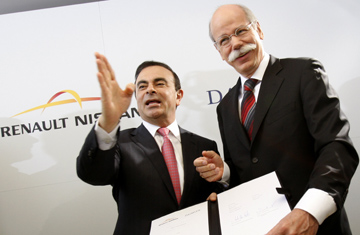
President of Renault SA and Nissan Motor Co., Carlos Ghosn, left, and President of Daimler AG, Dieter Zetsche speak after signing an agreement in Brussels, Wednesday April 7, 2010.
Who stands to benefit most by the deal announced Wednesday by Daimler, Renault and Nissan that they'd form a triple alliance geared toward developing a new generation of small cars and greener diesel and gas engines? It could be Mother Earth.
The deal, which may well be the auto industry's first green alliance, is nothing short of a total surrender to new climate regulations on the part of the carmakers. Over the past decade, the European Commission has enacted tougher restrictions on carbon dioxide emissions in the European Union's 27 member states, setting a target limit of 90 grams of CO2 output per kilometer by 2020. (The current ceiling is 130 grams per kilometer.) This will force carmakers to cut fuel consumption to around four liters per 100 kilometers, or about one gallon per 59 miles. This is about half the gas used by one of Daimler's sleek Mercedes limousines today. "The 2020 target is game-changing. That's what this deal is all about," Arndt Ellinghorst, an automotive analyst at Credit Suisse, tells TIME.
The bottom line for European carmakers is that they'll need to start making more fuel-efficient engines and smaller cars — and fast. Daimler has the technology and know-how to do so, but it doesn't have manufacturing facilities big enough to produce the cars and engines on a mass scale. That's where Renault and Nissan come in. The deal spares Daimler the cost of developing its own engines for small cars and constructing new facilities to produce them in the numbers that Renault is already able to do. By swapping engines and technology, both companies share the costs of innovation needed to build a new class of fuel-efficient vehicles. And Renault gets an additional boost from increasing production at its plants to supply Daimler's vehicles. "In the area of new technologies, demands from regulators and consumers are intense and unrelenting," Renault-Nissan chief executive Carlos Ghosn told reporters Wednesday in Brussels. "We have to continue to develop a wide range of new technologies to stay relevant and competitive, and the investments required on the front end are significant."
Ghosn and Dieter Zetsche, the mustachioed CEO of Daimler, have stressed that both sides are bringing something to the table. The three carmakers agreed to cooperate on the production of the next generation of Mercedes' Smart For Two, its two-door, subcompact car, and Renault's Twingo series. The new models will be launched in 2013 and come with fully electric drivetrains. Renault-Nissan will also provide three- and four-cylinder diesel and gas engines for the Smart and Twingo cars, and Daimler, in turn, will contribute four- and six-cylinder diesel and gas engines to Infiniti, Nissan's luxury car, a move aimed at strengthening the brand in the U.S., China and emerging markets.
The deal also makes sense from a financial standpoint. The three carmakers are under enormous pressure to cut costs amid the economic downturn, especially as demand for vehicles has plummeted. Daimler reported a 20% drop in sales last year and a net loss of nearly $3.5 billion. Meanwhile, Renault's sales fell by 11% and the company reported a net loss of $4.1 billion last year, and Nissan's sales dropped by 19.5% during the first nine months of its business year, which ended March 31. By exchanging technology and sharing development costs, Ghosn and Zetsche expect the alliance to help the companies save as much as $2.6 billion apiece over the next five years. To emphasize the long-term nature of the deal, the companies also agreed to a symbolic exchange of shares. Daimler will take a 3.1% stake in both Renault and Nissan, while each of those companies will take a 1.55% stake in Daimler.
The German company is still haunted by the disastrous outcome of past attempts to forge global alliances, most notably its merger with Chrysler, which ended in a messy divorce in 2007. Zetsche is insistent that this time around Daimler had found the right partner and things would go differently. "When we came together with Chrysler, we were in agreement about the merger, but we hadn't thought much about the content of collaboration," Zetsche told reporters in Brussels. "Here it's very different. We have worked together on very specific projects for a number of months now."
There is still some uncertainty surrounding the new deal, though, because of the involvement of the French government, which owns a 15% stake in Renault. Given the choice, Daimler would prefer not to have a silent partner in French President Nicolas Sarkozy, who could force strategic changes at Renault to benefit French workers (and appease voters) rather than Daimler's shareholders. Earlier this year, for example, Sarkozy forced Renault to scrap plans to outsource parts for its Clio subcompact car to Turkey, saying French cars for the French market should have French parts. "If Daimler had another choice it surely would not want to do a deal with the French state," Ellinghorst says. "But the fact is, Daimler has no choice."
